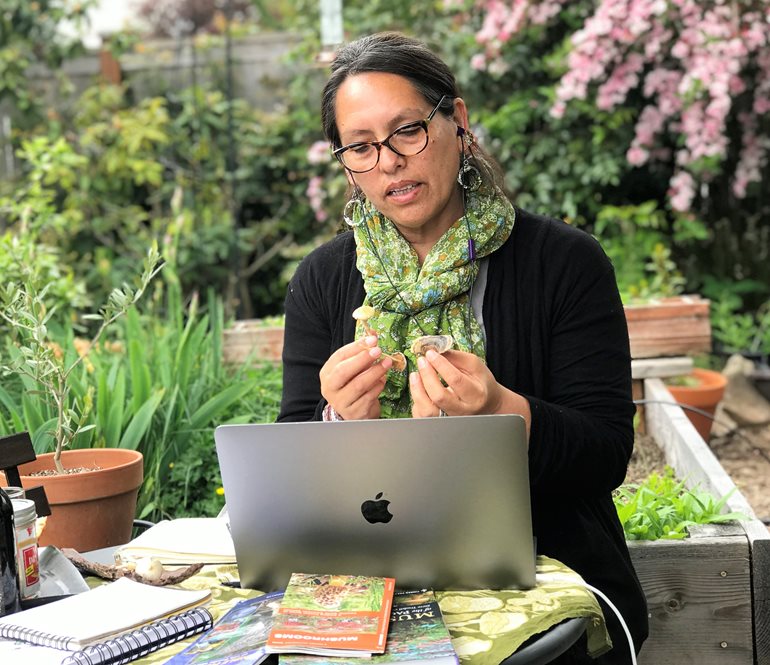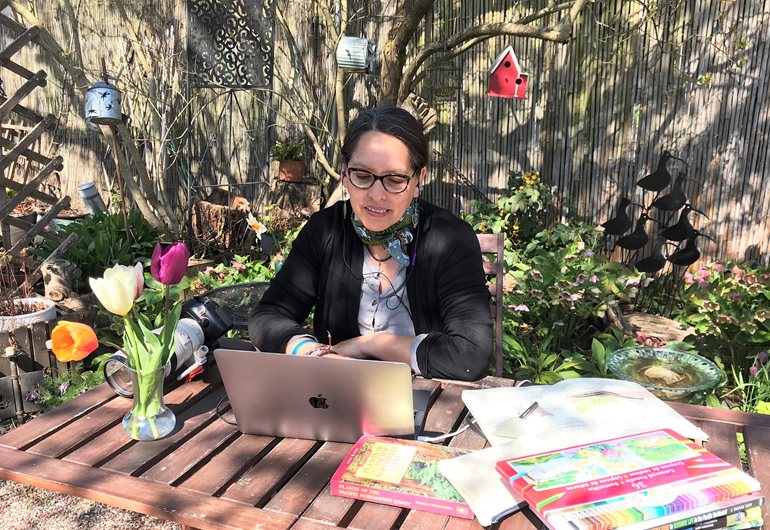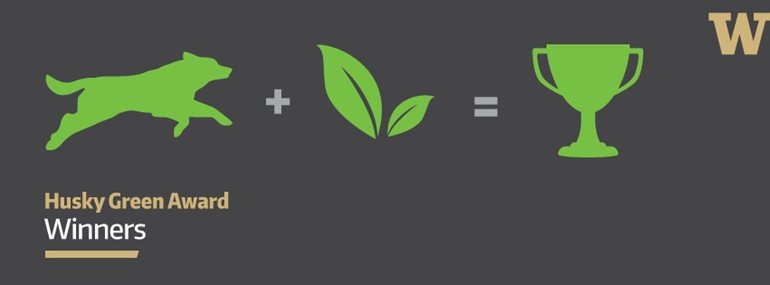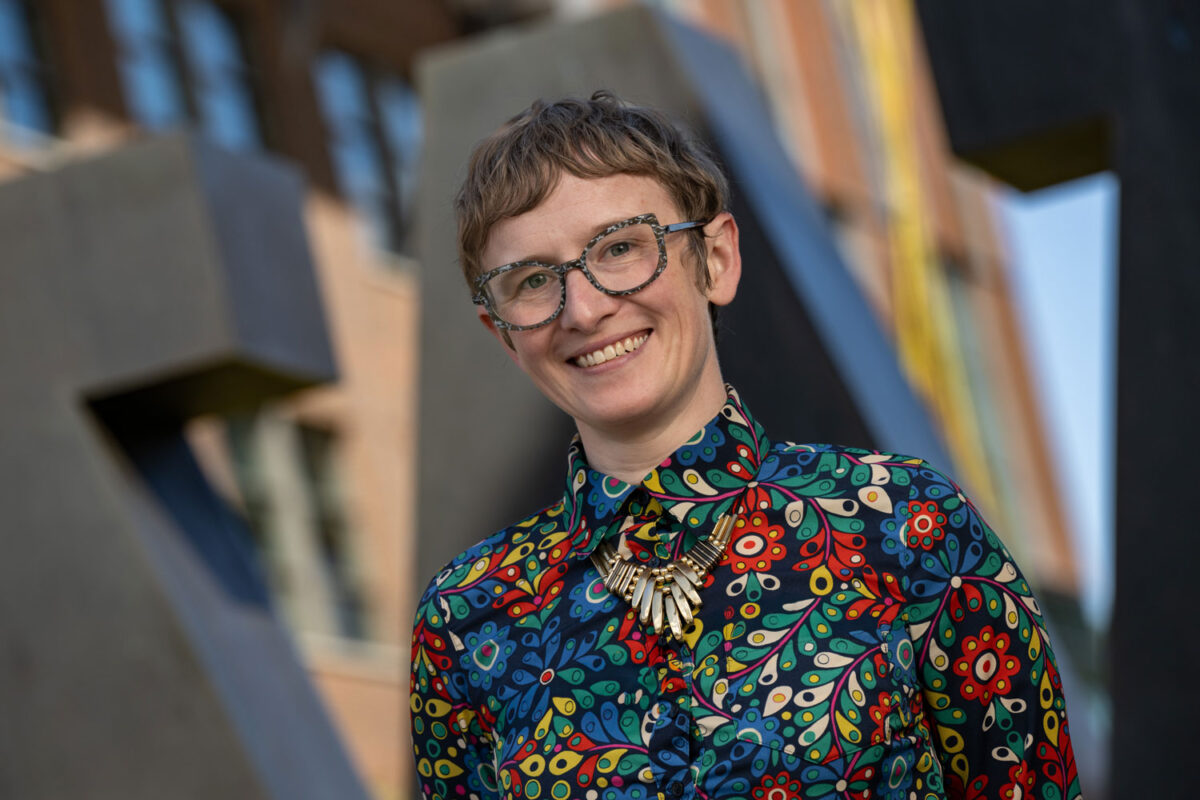
By Sean Park
Ursula Valdez, a lecturer in the School of Interdisciplinary Arts & Sciences, has been named a recipient of a 2020 Husky Green Award, which recognizes people or groups who exemplify a commitment to sustainability at the University of Washington.
In honoring Valdez, the selection committee highlighted how she incorporates both conservation and sustainability into her classes and in activities off campus.
“She actively encourages students and other researchers to document avian diversity and natural history in urban spaces and educates them on how to restore these habitats,” the committee noted. “She also encourages students and colleagues to reduce their personal ecological footprint in both their academic and personal lives.
“Due to popular demand, Valdez also created a ‘Sustainability on a Student Budget’ course to teach students how to embrace affordable, sustainable practices for everyday life.”
This is the 11th year the awards have been awarded by the UW Environmental Stewardship Committee as part of the UW’s Earth Day celebrations. Valdez is the only recipient from UW Bothell this year.
Nature is everywhere

One of the core ways Valdez demonstrates her commitment to preserving and protecting the environment is through her teaching at the Bothell campus, including most recently a Discovery Core class called Natural History of the Pacific Northwest.
Designed not just to familiarize students with environmental issues, the course also is meant to actively engage them with the local ecosystem. In normal circumstances, Valdez would lead her students to the campus wetlands for tours and to have discussions about the animals and plants in this natural habitat. But with classes being held online this spring quarter due to the coronavirus pandemic, Valdez had to find a way to teach students how to observe nature and stimulate their curiosity for it without being outside together.
What seemed like a teaching impediment at first, however, turned out to be a blessing in disguise.
Despite not being able to use the natural habitat on and around campus, Valdez reminded her students that they live in the Pacific Northwest. “If you think about it, we don’t need to go anywhere particular to discover nature,” said Valdez. “It’s everywhere around us.”
Observing and journaling
Students were assigned to create their own naturalist journals. Each entry includes observational notes, ideas, “curiosity” questions and sketches about a particular species in each student’s neighborhood. Valdez encouraged the students to pay close attention to the details and continue to ask questions as they do further research.
“Curiosity, that desire, that sense of wonder, is what I’m trying to provoke out of my students,” said Valdez. “When they come across something, they should be asking, ‘Why does it function like that?’ ‘Why is it that color?’”
The purpose of these journals is to help students learn by engaging them with first-hand experiences. As they create their journals, the students are also following steps similar to what biologists do when conducting research.
“The more they pay attention to detail, the more thorough their answers will be,” said Valdez. “Nature provides the opportunity to observe and recognize details, and this skill is valuable in any career.”
Practicing effective rhetoric
The journals serve as a way for students to capture their own reflections. Students are then assigned to write blogs so they can learn how to communicate their discoveries to a larger audience.
“Blogs require deeper research and more elaborated descriptions,” said Valdez. “The students have to interview experts and learn more about the overall ecosystem of their topic.”
The goal of this project is more than just learning the importance of communicating effectively, she adds. It also is designed to help students understand how quickly and easily false information can spread.
It highlights the importance of using credible publications and sources to back up scientific claims, as well. “In today’s digital world, it’s fair to be a skeptic,” said Valdez. “With so much false information out there, it’s important to know how to distinguish what is true and what is not.
“Sometimes, the inaccuracy comes simply from misinterpreting information,” she said. “But it’s important for students to learn the value of effective communication at a young age so they can continue to practice throughout their careers.”
Playing a part in the ecosystem

As the Husky Green Award committee noted, Valdez’s commitment to sustainability has influenced her students and peers to reduce their ecological footprints.
“I’ve already learned so much about plant and animal behaviors and the importance of their role in the ecosystem,” said Heather Bartlett, a sophomore in this spring’s Discovery Core class. “I decided to take this course because I was interested in nature, and now I’m looking up ways to take care of the planet properly, especially species that are becoming extinct.”
Notes Valdez: “Appreciating nature and taking the time to understand our surroundings is crucial because we all have a part to play in preserving the earth. Do we ever think of nature as a source of air, food and water? Obviously, we do. But do we really recognize and appreciate the elements that keep us alive?
“Understanding that we are all part of one ecosystem,” said Valdez, “is literally a matter of survival.”
Serving as a role model
Valdez says her path to sustainability came from growing up in a family that had a deep appreciation for nature and the outdoors.
“My getting into more conservation and sustainability practices, however, was through my career in conservation and a very good friend who pushed me into ‘walking the talk,’” she said. “That motivated me to change my personal life practices to minimize the ecological footprint of my actions.
“It has been now 25 years of working through personal practices — changes in my diet, shopping choices and habits, reusing and reducing, driving less, biking, walking, etc. It was a long and not easy process,” she said, “but I feel that I made a little contribution to the larger scope. It also has made me personally happier, and we also save a lot of money in our household.”
Full circle, these personal choices also now inform and inspire her academic and volunteer work.
“Sustainability is part of my life, and I have connected in this way with many members of my local and international community and in my courses at UW Bothell,” she said. “I have incorporated more topics on sustainability and reducing ecological footprints in my courses and in working in urban agriculture with the local community. It also is central to the study abroad program I run for students in Peru, my native country where I am part of the conservation and education collaboration.
“I feel the responsibility to engage others through education and community work.”



